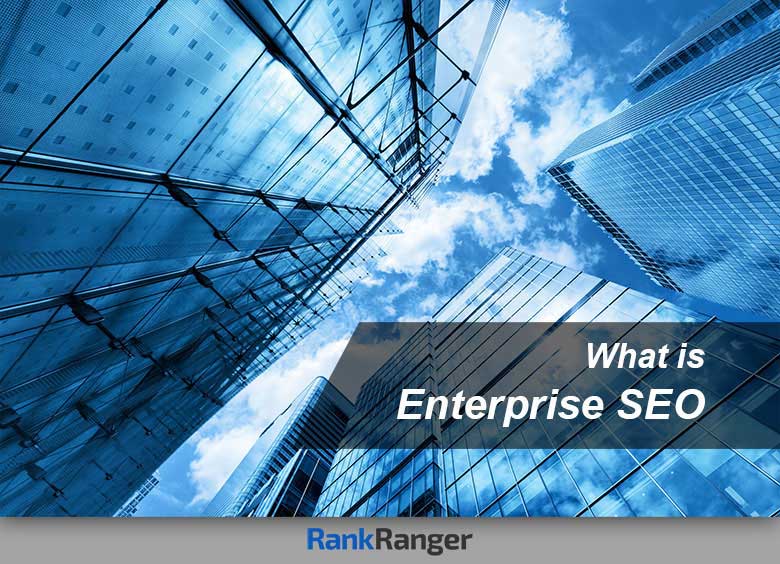
Posted by
Darrell Mordecai

I have a question for you.
If you were hired to do SEO for a big brand like Cisco Systems or Sony, how would you approach it?
Would you do anything different to any other SEO project?
I mean, the search engines don’t differentiate between small sites and big sites. So would you do anything differently?
In this post I’ll answer:
- What is enterprise SEO?
- What is an enterprise SEO strategy?
- What enterprise SEO tools should you know about?
What is Enterprise SEO?
Enterprise SEO is a large-scale approach to SEO designed to strategically increase organic traffic for enterprise-level websites. This requires the SEO to optimize sites with literally thousands of pages while targeting all aspects of the sales funnel.
Now, it’s important to understand that the same rules of SEO that apply to sites like these apply to all other sites on the net.
So, I’m sure you’re wondering…
Why do enterprise companies need a special approach to SEO? It comes down to one word.
Execution.
Allow me to explain.
Enterprise sites often consist of literally tens of thousands of pages. How do you optimize so many pages? Complexity gives rise to a huge amount of potential SEO issues. Imagine creating internal links for ten thousand pages!
Also, enterprise-level sites don’t just have an enormous amount of content, they also have a social media presence to worry about as well as product images and numerous other assets.
On top of that, the business has a reputation to uphold. This doesn’t only mean that every asset must be aligned to the company’s core values, it also means that unhappy customers posting bad reviews or negative news stories could have devastating results.
Now, all of the issues stated above are related to the content.
But, issues might even arise from the company culture itself.
In other words, working with larger businesses means dealing with many more stakeholders. Each stakeholder is focused on one piece of the pie. An SEO might have to literally jump through hoops to get approval for any SEO actions the site needs and this requires a unique set of communication skills.
Now that you understand why an enterprise business has unique SEO needs, let’s get into the SEO strategy.
Enterprise SEO Strategy
It’s important to understand that the difference in strategy is not only based on the complexity of working on such a big site.
There is another factor at play.
Think about this.
Bigger businesses have much bigger budgets as well as greater authority.
An enterprise company can afford to create a top-down strategy that targets every stage of the buyer’s journey. This way the company can serve the buyer long before they are ready to make a purchase.
To understand this, let’s compare the keyword targeting strategies of enterprise brands and small businesses.

Benefits of Enterprise SEO – Enterprise vs Small Business Keyword Targeting
A small business simply doesn’t have the same authority that an enterprise has.
This means when creating a ranking strategy, the small business will focus on the lowest competition keywords first and then try to rank for higher competition keywords once the site gains momentum.
By far the easiest keywords to target are long tail keywords.
This is true for two reasons:
- Long tail keywords have low search volumes making them seem less desirable resulting in lower competition
- They are easy to create content for because their search intent is almost always crystal clear

This generally results in a bottom-up approach.
An enterprise business on the other hand has greater resources at its disposal, allowing the company to:
- Build links at scale
- Create content that targets broad topics
This means they can afford a top-down approach.
A top-down approach means hitting all aspects of a content topic starting with highly competitive short tail keywords.
Short tail keywords can potentially bring in enormous amounts of traffic. However, these keywords generally only speak to searchers at the top of the buyer’s journey.
At the awareness stage.
The point of targeting this stage is, as I mentioned above, to increase brand awareness and to engineer the first touchpoints with the brand.
The company can then create content for middle of the funnel and bottom of the funnel users, resulting in users interacting with the business at all stages of the buyer’s journey.
Let me illustrate the point.
Imagine a person with an issue with uneven skin tone. If the issue bothers them, they’re not likely to just run to a shop to buy a skin cream.
Instead, they might start by reading about their problem. Reading about it might lead them to want a skin cream to solve their problem.
However, they might not endanger the health of their skin by using just any cream. Instead, they might hunt for a reputable brand that sells a product without harmful chemicals.
In the example above, the buyer performed many searches before making a purchase. Getting from the problem to the purchase literally took a journey.
This means that the more places the brand can enter the buyer’s journey the better the relationship will be and the bigger the chances of making a sale.
As a result, an enterprise company generally tends to have a top-down approach to keyword targeting.
Now that we’ve understood enterprise keyword targeting, let’s look at another issue.
Limited manpower.
Multiply Your Team by Using SEO Automation
When working on a big site, the SEO team generally finds themselves limited on time and manpower. There simply aren’t enough hours in the day to optimize hundreds or even thousands of pages.
To get around this, the team must use tools that allow them to automate repetitive tasks.
However, there is more to automation than this.
Think of SEO automation as a tool that you can use at every stage of the process.
But, before looking for SEO automation tools, you first have to thoroughly understand the entire process of your SEO. Understanding that will help you break it down into a series of steps and actions.
Once you’ve done that, you can then look for ways to automate each step. Automation can be used for almost any aspect of SEO.
For instance, you can use automation to:
- Extract specific data points
- Optimize on-page SEO
- Set up client reports
- Create content
For example, instead of using regular keyword research tools, why not use an API to gather a large amount of keyword data and Python to refine the data.
Although SEO automation is a big topic, here are a few simple examples to get you thinking.
Email Notifications
When dealing with a gigantic site, keeping track of your key metrics is a daunting task. A task that can easily steal your attention away from more important tasks.
Email notifications can easily solve this by sending you a message when a significant change occurs on the site.
For instance, Rank Ranger provides a number of email notification options.
There are notifications for:
- Rank changes
- Changes to backlinks
- Changes to landing pages
- Reputation management
- SERP feature changes
…and way more.
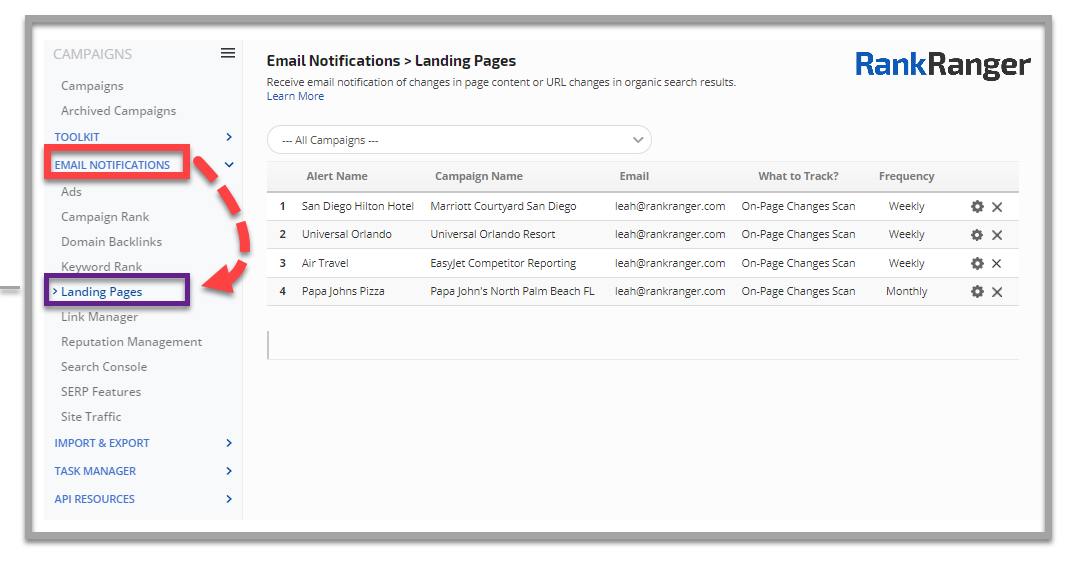
So, imagine this.
One of your valuable pages suddenly drops ten places in the rankings. Wouldn’t you **** to get an email notification letting you know?
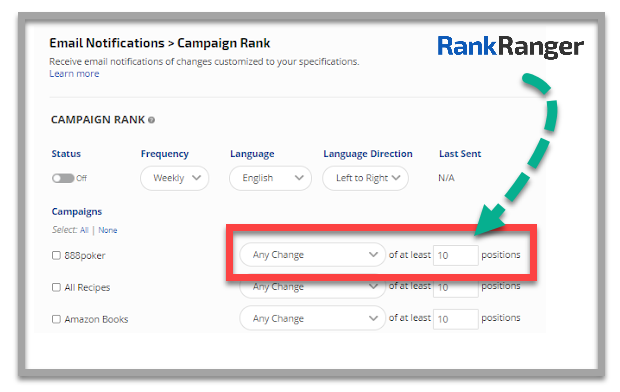
Or one of your junior employees makes a change to one of your most valuable landing pages that could potentially cause havoc with your rankings.
Setting up an email notification could save you hours of digging to find what caused the ranking loss.
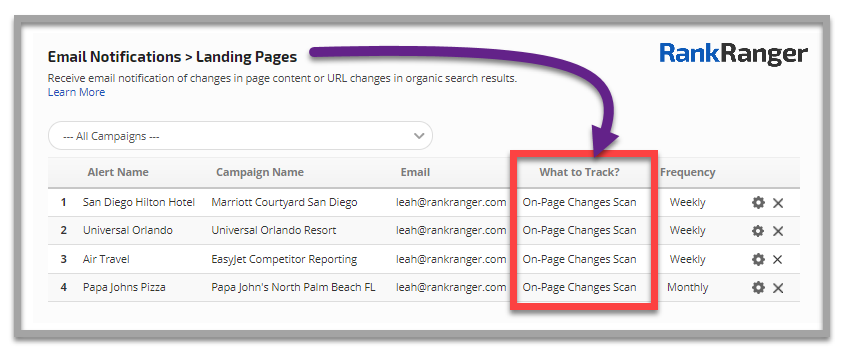
Or, what if one of your most valuable backlinks goes dead? A timely email can help you quickly reach out to the site owner to have it reinstated.
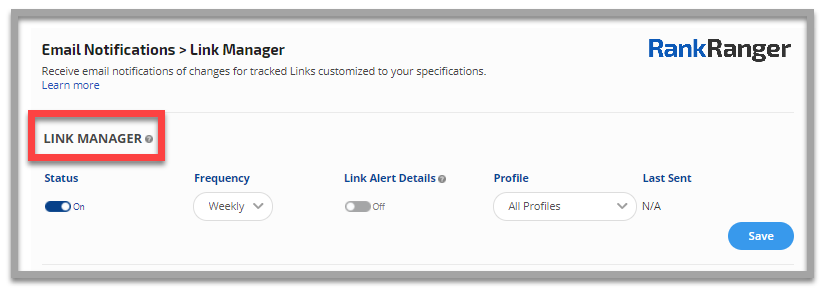
Think of your email notifications as your eyes on the ground. They will alert you to what’s going on when you’re not there.
Automated Client Reporting
Another task that hungrily eats away at your time is SEO client reporting. However, reporting is something you simply can’t ignore.
It’s a way to communicate with your client about how your marketing efforts are going. But important as it is, spending too much time every month could really blunt your effectiveness as an SEO.
This means automating your reporting is crucial. What’s more, it’s easy to set up and can save your team countless hours every month, freeing you up for more high-level tasks.
For instance, our SEO reporting dashboards and PDF reports are fully automated. As an SEO you could potentially present any aspect of your data on one automated report. What’s more, since it’s automated you only have to set it up once.
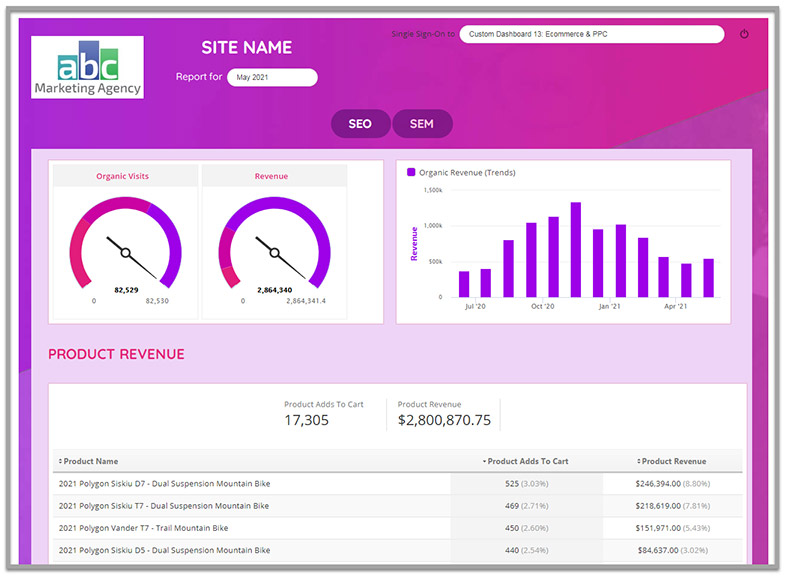
I’ve merely scratched the SEO automation surface.
Now, there is another crucial aspect to enterprise SEO.
Reputation management.
Protect Your Greatest Asset, Your Reputation
There is much more to creating a great brand experience than advertising tone of voice and using consistent images in all of a site’s marketing channels.
The thing is…
A few negative brand mentions can easily destroy a company’s reputation and completely undermine a brand’s image.
What’s more, a business could literally take years to build relationships with its customers, only to have some negative press undermine it in a few days.
And…
The greater the authority a company has, the higher the possibility for bad PR. Negative news and discussions can quickly dominate branded search results.
Monitoring this is crucial.
In other words, when a potential buyer types a brand name into Google, what will they find?
And don’t forget, potential buyers are looking for objective reviews. Reviews on third-party sites. Sites that you don’t necessarily control.
No matter how good your PR team is, you need a sophisticated SEO strategy to serve up more accurate SERPs.
This starts by having a good reputation management tool.
A Reputation Management Tool, Your Eyes on the Ground
For instance, our Reputation Management tool gives you a good understanding of how people are interacting with your brand.
The tool tracks brand mentions and assesses whether they are positive, neutral, or negative.
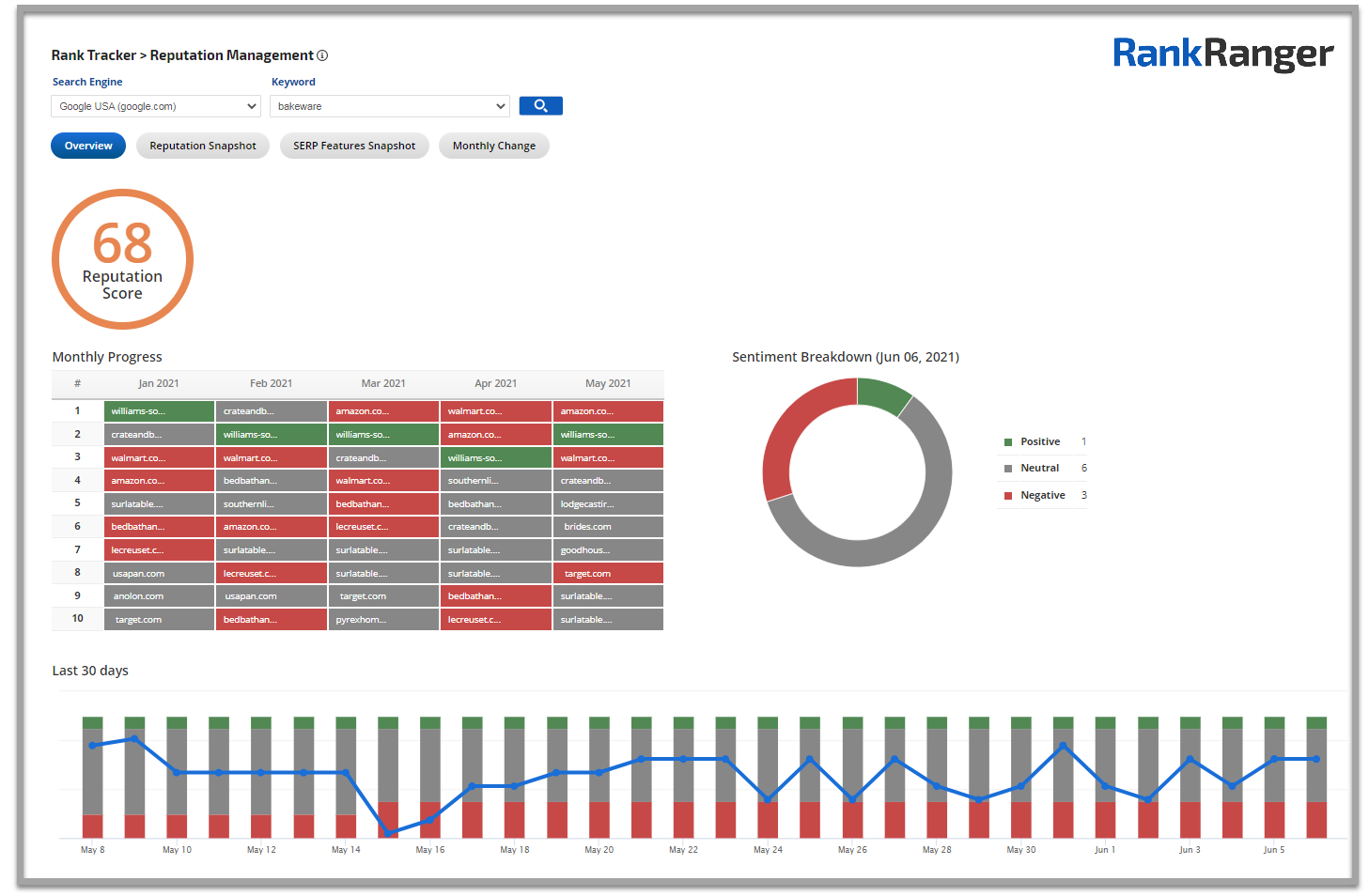
It then gives you a score out of 100 as well as plotting your mentions over a period of 30 days. You can use this data to easily see where the mentions are coming from so that you can do something about it.
You can also assess your progress by seeing the general trend over 30 days.
Once you find a reputation issue, look at all the negative mentions to see if there is a pattern to them. If you find a pattern, you can easily create a strategy to counter it.
Having touched on keyword targeting, automation, and reputation management, there is one more thing to cover.
It’s the glue that binds the entire enterprise SEO approach together.
Communication.
Make Your Communication Count
Making changes to a large site often presents a unique challenge. There are generally numerous departments that need to work together to get a task done.
So for instance, in order to create a unique piece of content, a content writer, designer, developer, and social media manager will have to work together to get the task done.
This means the SEO will have to get buy-in from numerous departments. And since each department has its own focus and its own targets to meet, implementing suggestions from the SEO team might not be the top priority.
There are often internal politics involved in getting the simplest task done.
This means it’s crucial for the SEO to add people skills such as negotiation and influence to their marketing and SEO skills.
Especially when it comes to making big changes to things like site structure. Often there are meetings with multiple stakeholders. Each one needs to buy in to the suggested change.
A process like this can take weeks to implement and often the changes never get implemented.
So…
In order to counteract this problem, as an SEO you have to learn to think like people in numerous departments.
In other words, how will the developer react to this change? Do they understand that it’s important enough to stop what they are already doing to implement the change?
How would you sell it?
This means as an SEO you’d also have to learn to influence people and negotiate with them.
Cracking the Enterprise SEO Nut

Although search engines don’t treat enterprise brands differently than other sites, there is no question that these sites need a unique approach.
As an SEO working on an enterprise site you’ll have to see yourself as a small cog in a big machine. How will your decisions affect the business internally and externally?
This might lead you to acquire unique skill sets.
If you’re willing to wear many hats and justify every recommendation then maybe enterprise SEO is for you.




